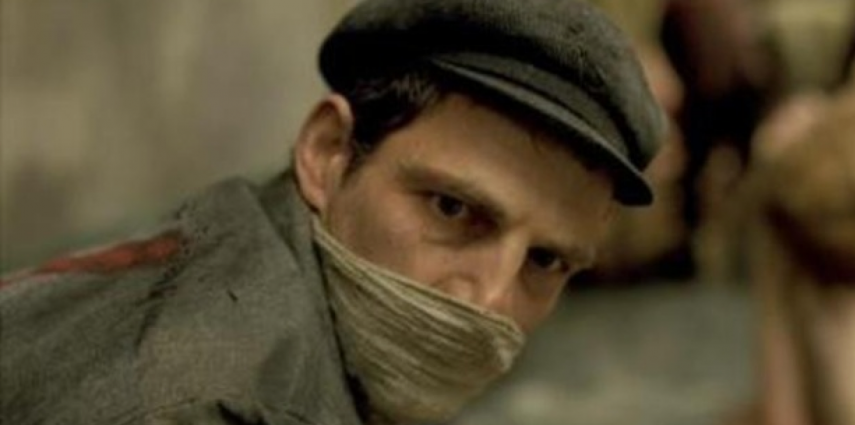SON OF SAUL (SAUL FIA)
Director: László Nemes
Stars: Géza Röhrig, Levente Molnár, Urs Rechn
* * * * * (out of 5)
It starts with one of the most powerful, singular opening scenes in recent cinema: an out-of-focus frame, into which staggers a wraith-like figure who we follow in continuous, cramped close-up, while the wider world of chaotic, industrial-scale horror around him – Jews rounded up, tricked, stripped and loaded into a gas oven to their deaths, then the screaming and hammering from inside the chamber walls – remains both thankfully blurred and muffled, yet nightmarishly vivid, while the man rapidly, mechanically starts sorting the discarded clothes and possessions.
If we should bear witness to the Unwatchable, then László Nemes’s searing feature debut imagines a brilliant, apposite treatment of both his protagonist Saul, an Auschwitz-Birkenau Hungarian Sonderkommando – the prisoners assigned to facilitate the Final Solution in the concentration camps – and the Holocaust. An intensely first-person story, for the next 100 minutes we scarcely leave Saul’s side. The bodies pulled from the oven, the blood and vomit scrubbed from the floors, the casual sadism of the Nazi guards and hostility of his fellow workers, all are subsumed to Saul’s mission: to retrieve the body of a boy he finds still briefly breathing amid the carnage, one he claims is his own son, find a rabbi and give him a proper Jewish burial. Even inside this pit of hell on Earth.
Nemes is a former protégé of Hungary’s reigning cinema giant Bela Tarr, but whereas Tarr could spend literally hours going from A to B, Son of Saul is a blur of continual motion, never stopping to orientate its audience. We become as absorbed and marooned in Saul’s world as he is. Bit by bit, as he races around bullying, bribing, begging to achieve his goal, a background picture jerkily emerges from the shallow focus imagery; whispers of an upcoming planned escape and a possible culling of the Sonderkommando. Saul will allow neither to distract him and at one point, his one-track mind obstructs the nascent uprising. “You failed the living for the dead,” someone sneers. But in the charnel house around them, who’s to say what those definitions really mean any more.
Technically this is a stunning achievement. One might pity the production designer, whose work isn’t overtly showcased on a film with such a restricted visual strategy – made even more claustrophobic by cinematographer Matyas Erdely shooting in the cropped, retro 4:3 aspect ratio many filmmakers now experiment with. But in fact the fleeting, patchwork glimpses of the camp and its environs actually register as strongly as any wide shot. The layered sound design bears an equally heavy load, the groaning machinery, rifle cracks or snippets of Yiddish, German or Hungarian that float up out of the maelstrom further immersing us in Saul’s nightmare.
If the film’s absolute commitment to its stripped-down aesthetic gradually becomes exhausting, a more allusive, poetic shift in style helps re-energize the film’s climax. From start to finish, however, Röhrig’s mostly silent performance is enthralling and the idea that this is a first-time feature simply remarkable. Whether you’ve watched documentary (Night and Fog, Shoah) or fiction (Sophie’s Choice, Schindler’s List), you’ve never seen this subject treated in this way, Nemes effectively forcing us to re-question a spectacle cinema of such horrors. A certain awards contender here at Cannes and throughout the year ahead, Son of Saul is harrowing, essential, liberating viewing.
